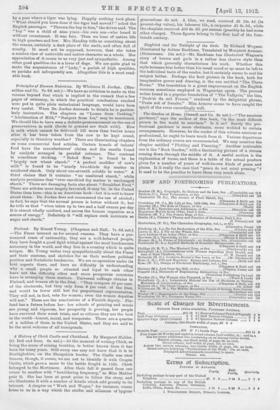Principles of Human Nutrition. By Whitman II. Jordan. (Mac- millan
and Co. Is. 6d. net.)—We have no criticism to make on this volume beyond that which is implied in the remark that a few pages of summary, in which the practical conclusions reached wore put in quite plain untechnical language, would have been very useful. When Dr. Jordan descends to details he is particu- larly instructive. The chapters on "Losses from Cooking," "Adulteration of Milk," "Dangers from Ice," may be mentioned. We should like to have seen a definite pronouncement on the use of preservatives in milk (foods in general are dealt with). How is milk which cannot be delivered till more than twelve hours after it has been taken from the cow to be kept sound, especially in thundery weather? There are illuminating chapters on some commercial food articles. Certain brands of infanta' food have the manufacturers' claims and the results found by analysis arranged in parallel columns. The contrast is sometimes striking. " Baked flour " is found to be "largely raw wheat starch." "A perfect modifier of cow's milk" is found to be "nearly two-thirds dry matter in unaltered starch. Only about one-seventh soluble in water." A third claims that it contains " no unaltered starch," while analysis proclaims that "over one-third dry matter is unchanged starch." There are damaging facts also about " Breakfast Food." These are articles more largely favoured, it may be, in the United States than here—this is an American book—but it is well to know about them. Dr. Jordan does not recommend the use of alcohol ; in fact, he says that the normal person is better without it; but he tolls us that " when taken up to two and a half ounces per day it is almost wholly oxidized, and servos the human organism as a source of energy." Definitely it "will replace such nutrients as sugar and starch,"






































 Previous page
Previous page